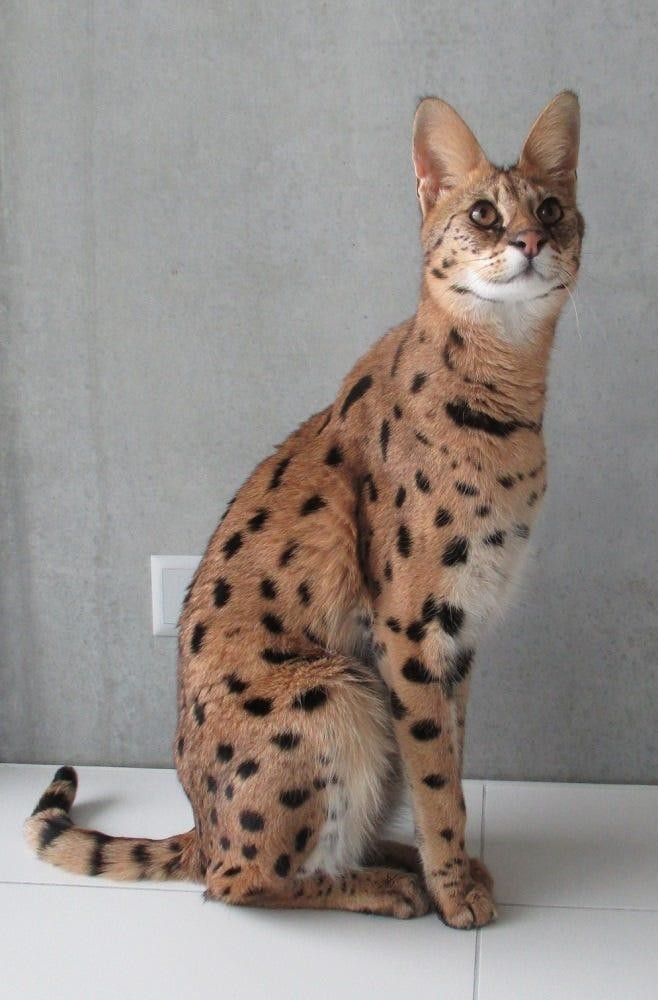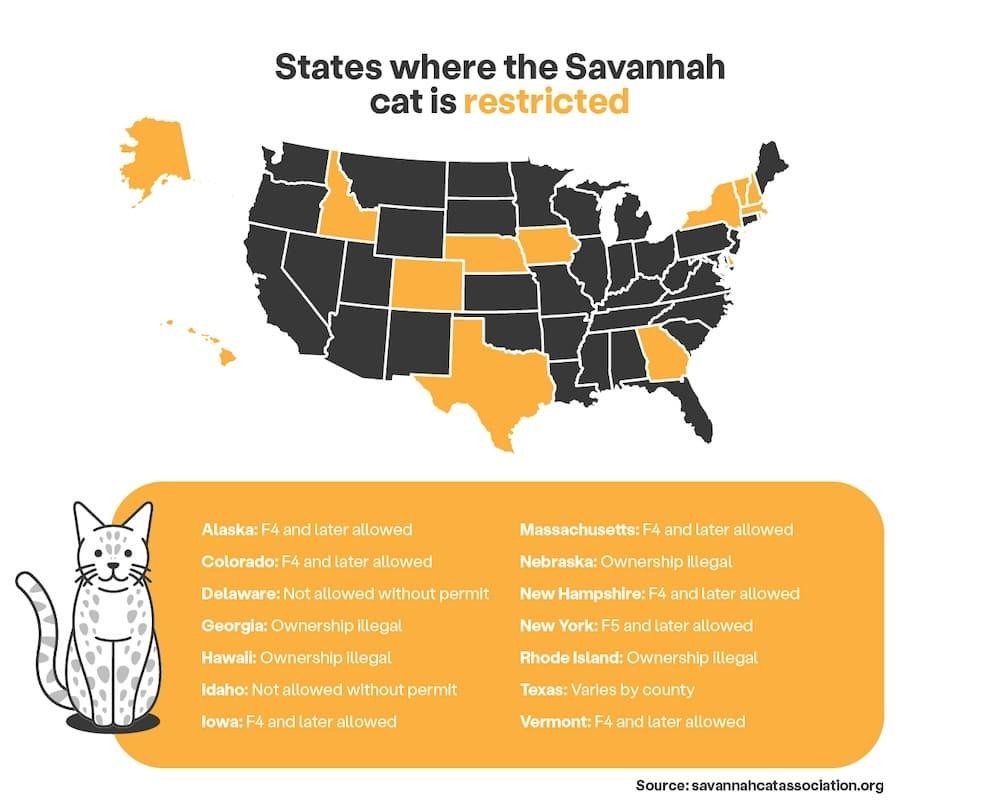Are you curious about Savannah cats and how much they cost? Savannah cats, with their exotic look and dog-like personalities, can be a unique addition to any household. On HOW.EDU.VN, we will dive into the factors determining the price of these beautiful hybrid cats, including filial generation and legal considerations, plus where to find expert advice on exotic pet ownership.
Savannah cats, known for their high energy and intelligence, come with a price tag that reflects their unique characteristics and the complexities of breeding them.
1. What is a Savannah Cat and What Makes Them Special?
Savannah cats are a hybrid breed resulting from crossing a domestic cat with an African serval. These cats are known for their striking appearance, which includes a spotted coat, tall ears, and long legs. Their exotic look, combined with an affectionate and playful personality, makes them a sought-after pet.
Unique Characteristics of Savannah Cats
- Appearance: Savannah cats have a spotted coat similar to that of a serval, with colors ranging from brown, tan, or gold to silver and black. They also have distinctive “tear-streak” markings running from the eyes to the nose.
- Size: Savannah cats are larger than most domestic cats, with F1 generation cats being the largest. They can weigh up to 25 pounds and stand up to 19 inches tall.
- Personality: Known for being intelligent, energetic, and loyal, Savannah cats often exhibit dog-like behaviors such as following their owners around the house and enjoying walks on a leash.
- Jumping Ability: These cats are incredible jumpers, capable of leaping up to 8 feet in the air.
Savannah Cat vs. Bengal Cat: Key Differences
Savannah cats and Bengal cats are both hybrid breeds, but they have distinct differences:
| Feature | Savannah Cat | Bengal Cat |
|---|---|---|
| Ancestry | Domestic cat and African serval | Domestic cat and Asian leopard cat |
| Size | Larger, especially F1 generation | Medium to large |
| Appearance | Spotted coat, tall ears, long legs | Spotted or marbled coat |
| Temperament | Energetic, intelligent, loyal | Energetic, playful, intelligent |
| Legal Issues | May be restricted in some jurisdictions | Generally legal without specific restrictions |




2. What Factors Influence the Price of a Savannah Cat?
Several factors influence the price of a Savannah cat, with the most significant being the filial generation. Other factors include breeder reputation, health certifications, and coat color.
Filial Generation (F1, F2, F3, etc.)
The filial generation indicates how many generations the Savannah cat is removed from its serval ancestor.
- F1 Savannah Cats: These are the first-generation offspring of a serval and a domestic cat. They are the largest and most exotic-looking, which makes them the most expensive, often ranging from $10,000 to $25,000 or more.
- F2 Savannah Cats: These are the offspring of an F1 Savannah cat and a domestic cat. They are typically smaller and more affordable than F1s, with prices ranging from $4,000 to $12,000.
- F3 Savannah Cats and Beyond: These generations are further removed from the serval ancestor and are generally more affordable, with prices ranging from $2,000 to $5,000 or more.
Breeder Reputation and Quality
Reputable breeders who prioritize the health and temperament of their cats often charge higher prices. These breeders conduct thorough health screenings, provide excellent care, and ensure their kittens are well-socialized.
Health Certifications and Guarantees
Savannah cats from breeders who offer health certifications and guarantees may cost more upfront, but they provide peace of mind that the cat has been screened for genetic health issues.
Coat Color and Pattern
The coat color and pattern can also affect the price. More exotic or rare colors and patterns may command a higher price. Savannah cats typically have a spotted coat in brown, tan, or gold; silver; and black or black-smoke colors.
Location and Availability
The location of the breeder and the availability of Savannah kittens in your area can also influence the price. Areas with fewer breeders may have higher prices due to increased demand.
3. How Much Do Savannah Cats Cost on Average?
Savannah cat prices vary significantly depending on the factors mentioned above. Here’s a general breakdown of the average costs:
F1 Savannah Cats: $10,000 – $25,000+
F1 Savannah cats are the most expensive due to their close genetic relationship to the serval. They are the largest, most exotic-looking, and can be challenging to breed.
F2 Savannah Cats: $4,000 – $12,000
F2 Savannah cats are more affordable than F1s but still retain many of the desired traits, such as their size and spotted coat.
F3 Savannah Cats and Beyond: $2,000 – $5,000+
F3 and later generations are the most budget-friendly option, though they still offer the unique appearance and personality of the Savannah breed.
Additional Costs to Consider
In addition to the initial purchase price, consider the ongoing costs of owning a Savannah cat:
- Food: Savannah cats require a high-quality diet rich in animal protein. Taurine supplements are often recommended.
- Veterinary Care: Regular check-ups, vaccinations, and potential health issues can add to the cost.
- Litter: Due to their size, Savannah cats may require more litter than average domestic cats.
- Toys and Enrichment: Savannah cats are intelligent and energetic, requiring plenty of toys and enrichment activities to keep them stimulated.
4. Why Are Savannah Cats So Expensive?
Several factors contribute to the high cost of Savannah cats:
Difficulty in Breeding
Breeding Savannah cats can be challenging due to the significant difference in gestation periods between the African serval (75 days) and the domestic cat (65 days). There are also incompatibilities between each species’ sex chromosomes.
High Demand
The demand for Savannah cats is high due to their unique appearance and personality. This increased demand drives up the price, especially for F1 and F2 generations.
Specialized Care
Savannah cats require specialized care and attention, which adds to the breeder’s costs. This includes providing a suitable environment, a high-quality diet, and regular veterinary care.
Legal Restrictions
Some states have restrictions or outright bans on owning Savannah cats, particularly the F1 generation. This can limit the availability and increase the price in areas where they are legal.
5. What are the Legal Considerations for Owning a Savannah Cat?
Before purchasing a Savannah cat, it’s essential to research and understand the local regulations regarding ownership.
State Laws
Some U.S. states have outlawed owning Savannah cats or require permits. The following states have specific regulations:
| State | Regulations |
|---|---|
| Alaska | F4 and later allowed |
| Colorado | F4 and later allowed |
| Delaware | Not allowed without permit |
| Georgia | Ownership illegal |
| Hawaii | Ownership illegal |
| Idaho | Not allowed without permit |
| Iowa | F4 and later allowed |
| Massachusetts | F4 and later allowed |
| Nebraska | Ownership illegal |
| New Hampshire | F4 and later allowed |
| New York | F5 and later allowed |
| Rhode Island | Ownership illegal |
| Texas | Varies by county |
| Vermont | F4 and later allowed |
Local Ordinances
In addition to state laws, check local ordinances and regulations regarding exotic pet ownership. Some cities and counties may have their own restrictions.
Responsible Ownership
Even in areas where Savannah cats are legal, responsible ownership is essential. This includes providing proper care, ensuring the cat is contained and does not pose a threat to native wildlife, and being aware of potential liability issues.
6. Where Can You Buy a Savannah Cat?
When looking to purchase a Savannah cat, it’s essential to find a reputable breeder who prioritizes the health and temperament of their cats.
Reputable Breeders
Look for breeders who:
- Are registered with organizations such as The International Cat Association (TICA) or The Savannah Cat Association (SCA).
- Provide health certifications for their cats.
- Allow you to visit their facilities and meet the cats.
- Are knowledgeable about the breed and can answer your questions.
- Have a strong reputation and positive reviews from previous buyers.
Online Marketplaces
While online marketplaces can be a convenient way to find Savannah cats, exercise caution and thoroughly vet the breeder before making a purchase.
- Read reviews and testimonials carefully.
- Ask for references from previous buyers.
- Request health certifications and other documentation.
- Be wary of breeders who offer unrealistically low prices or pressure you to make a quick decision.
Rescue Organizations
While Savannah cats are not commonly found in rescue organizations, it’s worth checking with local shelters and breed-specific rescues to see if any are available.
7. What are the Key Considerations Before Buying a Savannah Cat?
Before buying a Savannah cat, consider whether you can provide the necessary care and attention this breed requires.
Commitment to Care
Savannah cats are high-maintenance pets that require a lot of exercise, play, and interaction. They are also highly intelligent and can be destructive if not properly stimulated.
Legal Compliance
Ensure that you comply with all local and state laws regarding Savannah cat ownership. Obtain any necessary permits or licenses.
Financial Stability
Savannah cats can be expensive to purchase and maintain. Ensure that you have the financial resources to provide proper care, including food, veterinary care, and enrichment activities.
Home Environment
Savannah cats need a safe and stimulating environment. This includes plenty of space to run and play, scratching posts, climbing structures, and toys.
Compatibility with Other Pets
Savannah cats have strong hunting instincts and may pose a threat to smaller pets such as rodents, birds, and fish. Introduce them slowly and supervise their interactions with other pets in the household.
8. What is the Personality and Temperament of a Savannah Cat?
Savannah cats are known for their unique personality and temperament, which combines traits of both domestic cats and wild servals.
Intelligence
Savannah cats are highly intelligent and can be trained to perform tricks and follow commands. They also enjoy puzzle toys and other activities that challenge their minds.
Energy Level
Savannah cats are energetic and playful, requiring plenty of exercise and interaction. They enjoy running, jumping, and exploring their environment.
Loyalty
Savannah cats are known for being loyal and affectionate towards their owners. They often follow their humans around the house and enjoy cuddling.
Socialization
Early socialization is essential for Savannah cats to develop into well-adjusted pets. Expose them to a variety of people, animals, and environments from a young age.
Dog-like Traits
Savannah cats often exhibit dog-like behaviors such as:
- Following their owners around the house.
- Enjoying walks on a leash.
- Playing fetch.
- Being loyal and protective of their family.
Enjoyment of Water
Unlike many domestic cats, Savannah cats often enjoy water. They may hop in the shower with you or take a swim in a small body of water.
9. How Do You Care for a Savannah Cat?
Caring for a Savannah cat requires a commitment to providing the proper environment, diet, and veterinary care.
Diet
Savannah cats require a high-quality diet rich in animal protein. Taurine supplements are often recommended to ensure they get enough of this essential amino acid.
Exercise
Savannah cats need plenty of exercise to stay healthy and happy. Provide them with opportunities to run, jump, and play.
Grooming
Savannah cats have short coats that require minimal grooming. Regular brushing can help reduce shedding.
Veterinary Care
Regular veterinary check-ups are essential for Savannah cats to ensure they are healthy and up-to-date on vaccinations.
Enrichment
Savannah cats are intelligent and need plenty of enrichment activities to keep them stimulated. Provide them with puzzle toys, climbing structures, and opportunities to explore their environment.
Litter Box Maintenance
Due to their size, Savannah cats may require more litter than average domestic cats. Scoop the litter box regularly to keep it clean and fresh.
10. Are Savannah Cats Good House Pets?
Savannah cats can make excellent house pets for the right owner. They are intelligent, energetic, and loyal, and can bring a lot of joy to a household.
Pros of Owning a Savannah Cat
- Unique appearance and personality
- Intelligent and trainable
- Loyal and affectionate
- Enjoy water and outdoor activities
Cons of Owning a Savannah Cat
- High maintenance and require a lot of attention
- Strong hunting instincts may pose a threat to smaller pets
- Can be destructive if not properly stimulated
- May be illegal or restricted in some areas
Considerations for Potential Owners
Before bringing a Savannah cat into your home, consider whether you can provide the necessary care and attention this breed requires.
- Are you prepared to commit to providing a stimulating and enriching environment?
- Can you handle a cat with strong hunting instincts?
- Are you willing to comply with all local and state laws regarding Savannah cat ownership?
- Do you have the financial resources to provide proper care, including food, veterinary care, and enrichment activities?
FAQ About Savannah Cats
1. How big do Savannah cats get?
Savannah cats can vary in size depending on their generation. F1 Savannah cats are the largest and can weigh up to 25 pounds and stand up to 19 inches tall. Later generations are typically smaller.
2. Are Savannah cats legal to own?
Savannah cat legality varies by state and local regulations. Some states have restrictions or outright bans on owning Savannah cats, particularly the F1 generation. Check your local laws before purchasing a Savannah cat.
3. What is the lifespan of a Savannah cat?
Savannah cats typically live for 12 to 20 years, with some living even longer with proper care.
4. Do Savannah cats get along with other pets?
Savannah cats have strong hunting instincts and may pose a threat to smaller pets such as rodents, birds, and fish. Introduce them slowly and supervise their interactions with other pets in the household.
5. What do Savannah cats eat?
Savannah cats require a high-quality diet rich in animal protein. Taurine supplements are often recommended to ensure they get enough of this essential amino acid.
6. How much exercise do Savannah cats need?
Savannah cats are energetic and need plenty of exercise to stay healthy and happy. Provide them with opportunities to run, jump, and play.
7. Are Savannah cats good with children?
Savannah cats can be good with children if they are properly socialized from a young age. Supervise their interactions to ensure they get along well.
8. Do Savannah cats need special grooming?
Savannah cats have short coats that require minimal grooming. Regular brushing can help reduce shedding.
9. How intelligent are Savannah cats?
Savannah cats are highly intelligent and can be trained to perform tricks and follow commands. They also enjoy puzzle toys and other activities that challenge their minds.
10. Are Savannah cats expensive to own?
Savannah cats can be expensive to purchase and maintain. Ensure that you have the financial resources to provide proper care, including food, veterinary care, and enrichment activities.
Need Expert Advice on Exotic Pet Ownership?
Understanding the nuances of exotic pet ownership, like caring for a Savannah cat, can be complex. At HOW.EDU.VN, we connect you with leading Ph.D. experts who can provide personalized guidance and support. Whether you have questions about legal regulations, specialized care, or finding reputable breeders, our experts are here to help.
Connect with Our Experts Today
Don’t navigate the complexities of exotic pet ownership alone. Reach out to our team of Ph.D. experts at HOW.EDU.VN for tailored advice and support.
Contact Information:
- Address: 456 Expertise Plaza, Consult City, CA 90210, United States
- WhatsApp: +1 (310) 555-1212
- Website: HOW.EDU.VN
Let how.edu.vn be your trusted resource for expert guidance on all aspects of exotic pet ownership. Our Ph.D. experts are ready to assist you every step of the way.